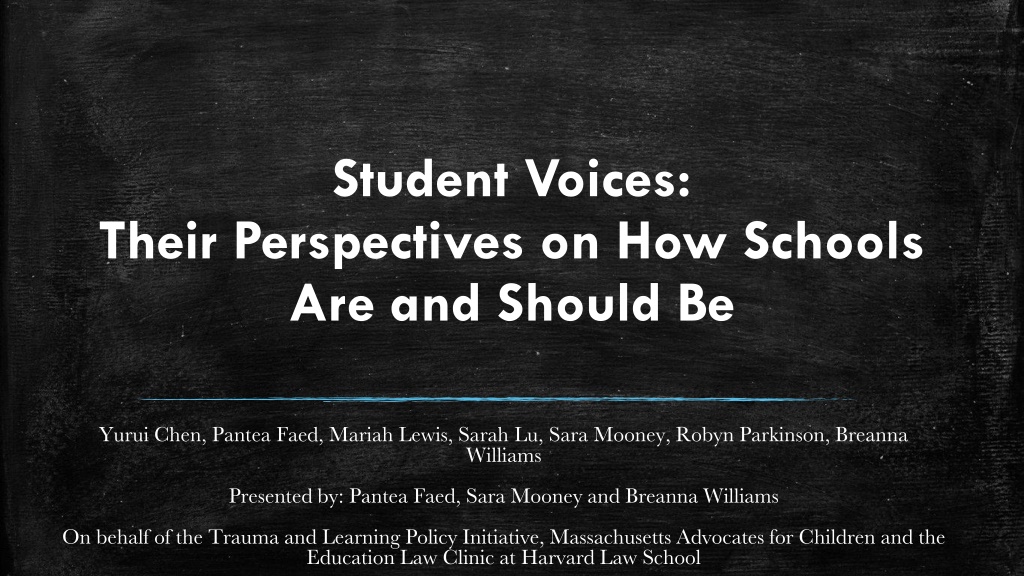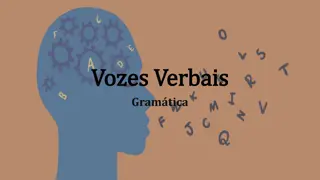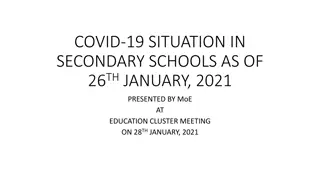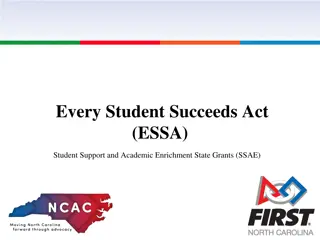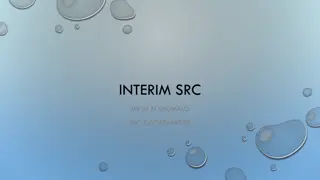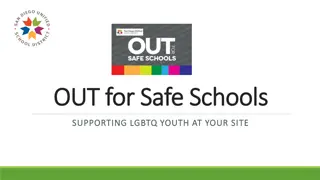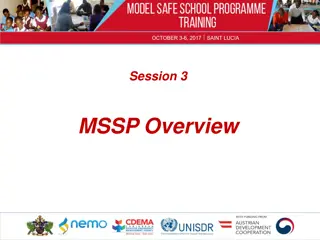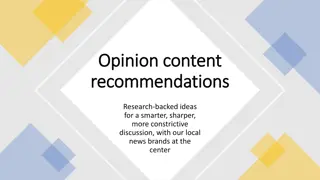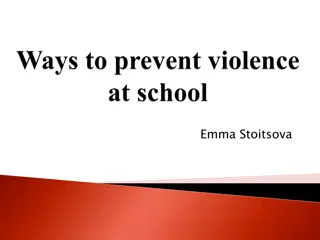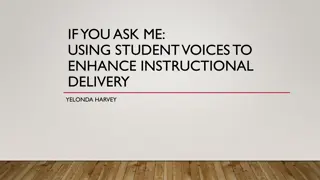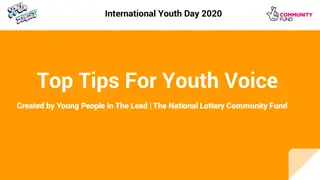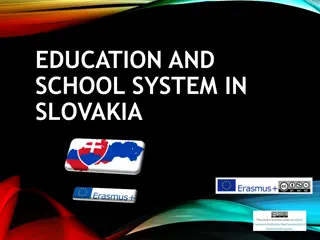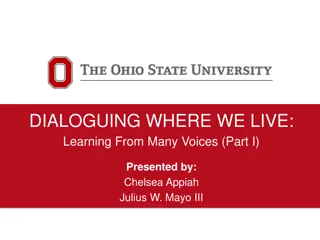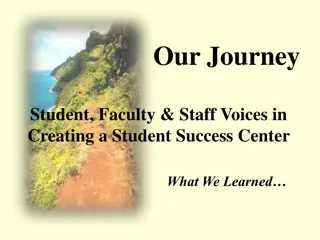Student Voices: Perspectives on Safe and Supportive Schools
This presentation by Student Voices highlights the perspectives of students on how schools are and should be. Through focus groups and discussions, students expressed the need for comfortable and calm classrooms, lower student-to-teacher ratios, and consistency in teaching staff to thrive academically and socially. The findings emphasize the importance of social-emotional, academic, and physical comfort, as well as positive relationships with teachers and peers for student success in school.
Download Presentation

Please find below an Image/Link to download the presentation.
The content on the website is provided AS IS for your information and personal use only. It may not be sold, licensed, or shared on other websites without obtaining consent from the author. Download presentation by click this link. If you encounter any issues during the download, it is possible that the publisher has removed the file from their server.
E N D
Presentation Transcript
Student Voices: Their Perspectives on How Schools Are and Should Be Yurui Chen, Pantea Faed, Mariah Lewis, Sarah Lu, Sara Mooney, Robyn Parkinson, Breanna Williams Presented by: Pantea Faed, Sara Mooney and Breanna Williams On behalf of the Trauma and Learning Policy Initiative, Massachusetts Advocates for Children and the Education Law Clinic at Harvard Law School
Agenda Purpose The Experts Methodology Findings Discussion
Purpose 2018 Commission Recommendations Focus Groups: seek[ing] opportunities for students to give their input and feedback on what Safe and Supportive Schools should look like, based on their experience and that of their peers. Accountability: continu[e] to provide opportunities to encourage, incentivize, and recognize Safe and Supportive Schools, including review[ing] the accountability system to consider ways to increasingly include and incentivize methods of promoting safe and supportive schools .
The Experts 71 students participated in 8 focus groups from across the state 51 currently included in the report Middle and high school students Primarily members of minority groups Diverse spectrum of learners: honors students, alternative school students, college bound students, and students with special needs.
Methodology Worksheet 1. What does a class that you learn a lot in look like, sound like, and feel like? and 2. What do spaces at school where you feel comfortable and safe look like, sound like and feel like? Focus group questions 1. What does your school currently do to help you do well? 2. Is there anything that you need to do well at school that you are not getting? 3. What would you want included on your school s report card? Transcript analysis & theme development
Findings What students need to do well in school Social-emotional, academic and physical comfort Positive, respectful relationships with teachers, administrators, staff and peers How students want schools to be measured Impacts of current accountability system The ideal landscape: including student input and experience
To Do Well Students Need Classrooms To be comfortable and calm To have lower student-to-teacher ratios To have consistency in teaching staff
It feels calm and relaxing. The teacher you can trust her and stuff, like to learn things...because it actually gives you time to get your mind thinking.
its really hard to find a consistent comfortable place around here. We have new teachers every single year and that goes back to the support system, because sometimes we build connections with these teachers, and these teachers really help us, but then when those teachers get cut we have to meet all these new teachers, where [does] our support system go?
To Do Well Students Need Teachers To form respectful relationships with them To understand them as whole people To understand their race and culture
I feel like some classes would be more productive if the teacher makes an effort to understand your side, and you feel comfortable talking to the teacher, class will go more easily. You won t be afraid to ask questions. Sometimes I feel like that s what students struggle with, like they might be struggling in class, but they don t feel comfortable talking to the teacher so they just stay in the back, and then they might fail because of that.
they should learn how to teach different kids different, because we re not all the same. If you go to [X high school] and you compare that to [Y high school] there are two totally different people, two different types of mindsets.
To Do Well Students Need Administrators To be respectful Equitable and consistent discipline practices To treat them fairly regardless of labels To understand their race and culture
I feel for the [lowest track] classes with the teachers, it s like they see what they want to see. If you want to see something bad, then you see something bad. That reflects on the students, in the students grades and in the classes. Of course they re going to fail because the teacher wants to see them fail.
To Do Well Students Need the Curriculum To be relevant and representative To include arts, athletics, and experiential learning To encourage genuine learning
We really dont have too many classes that teach to our lives. I think last year at the beginning of ninth grade, we did like two days of learning about taxes and interest and then we haven t learned about anything like that since. One of the things that I feel like they can change is doing things more that we can connect to and that we re going through. It s like in 10th grade-- we re 10th graders looking to get a job, looking for their permit and do other things like that.
To Do Well Students Need Facilities To be clean, modernized and regularly updated To be technologically equipped
I feel like, personally, we need more funds for our sports because a lot of kids don't enjoy sports, or they don't play because they see that they still have the old helmets and the old pads and everything. I just feel like, if we got more funds for the sports, more kids would want to be in a sport, other than in the streets.
To Do Well Students Need Supports & Resources To include supplemental programs (ie. afterschool, mental health, tutoring, social workers) To be well funded
A student attending a school that provides health, wellness and counseling support described how that service helped with emotions: They always check in, making sure if anything is happening with [students] personally, we re able to ask the teacher for a pass to health and wellness and do our work with the health and wellness, just to have our time to gather ourselves.
How Students Want Schools to be Measured Holistic Curriculum Teachers Mental Health Genuine Learning Understanding& Responsiveness
I feel like what really matters in school is if you re learning. I feel like in school I don t go to school to learn. That s actually ridiculous that I go to school every day to pass. I feel like the school should be graded on how the students are doing.
Theyll literally take the first quarter of the entire year, for a freshman will be how to pass the MCAS it s not just learning the curriculum, but it s also like they literally force you to pass because [our school] doesn t have good MCAS scores. They don t want us to be good. They want to make it look good.
People get suspended for just being late[the more] they get demerited, so the more they [teachers] send them out. A lot of people get in-house suspension but not suspension. They should put that on there [the accountability system] too and count it. They probably do that to make it look better When they suspend you, they don t really help you get your grades up...when I was suspended, I didn t get any work sent to me or anything like that.
Be clean, teach their students, have healthy food, care about their students, actually care adequately about their mental health and basically be behind their students and support their students, no matter what, instead of just saying, You're here to be here because you have to be here. Go learn, and not even teach them.
Where Do We Go From Here ?
